The Animal-Killing Syndicate You Pay For

Tormenting and killing animals in laboratory experiments will never produce the treatments humans need. The science is clear: Using animals to model human diseases is unreliable, cruel, and pointless.
Animals are sentient and value their lives just as we value ours. They have an interest in not being used in experiments that likely cause pain, always cause distress, and usually end in death. But there’s a small number of people sitting atop a small number of companies, universities, and government organizations whose wallets get fatter as live animals are used in experimentation, a practice known as vivisection.
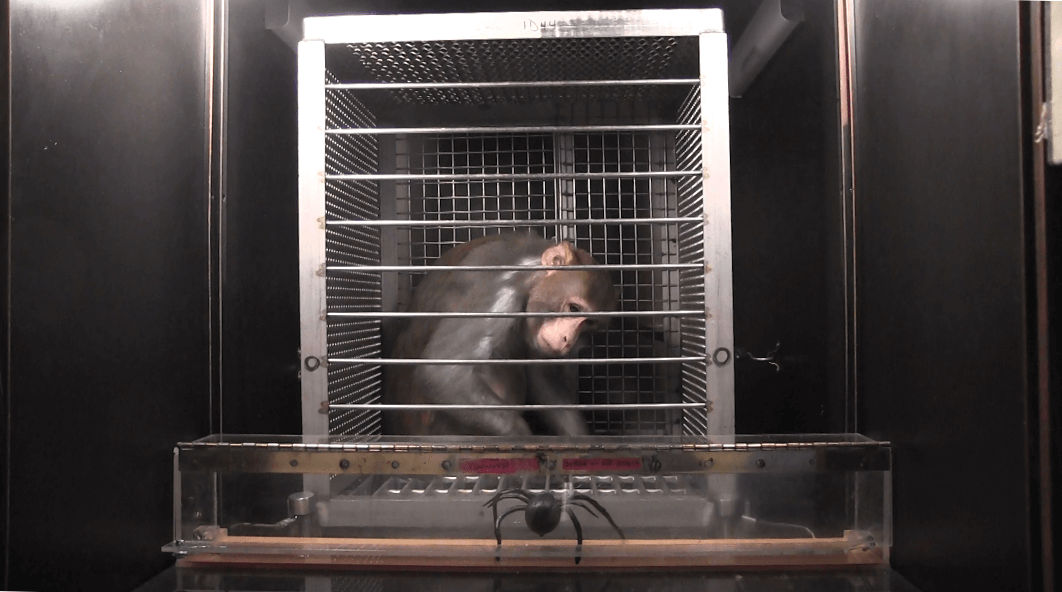
Meet the vivisection-industrial complex, the oligarchs of misery to whom suffering animals mean steady cash. They are enemies of progress and antagonists of sound science. They’re dedicated to starving legitimate avenues of scientific exploration that could have quite conceivably already cured numerous diseases, had they not been undermined for profit.
There’s no money in curing disease, after all, but there is a whole lot of money in conducting pointless experiments ad nauseum. The following are some of the companies invested in maintaining the status quo.
Victim Suppliers
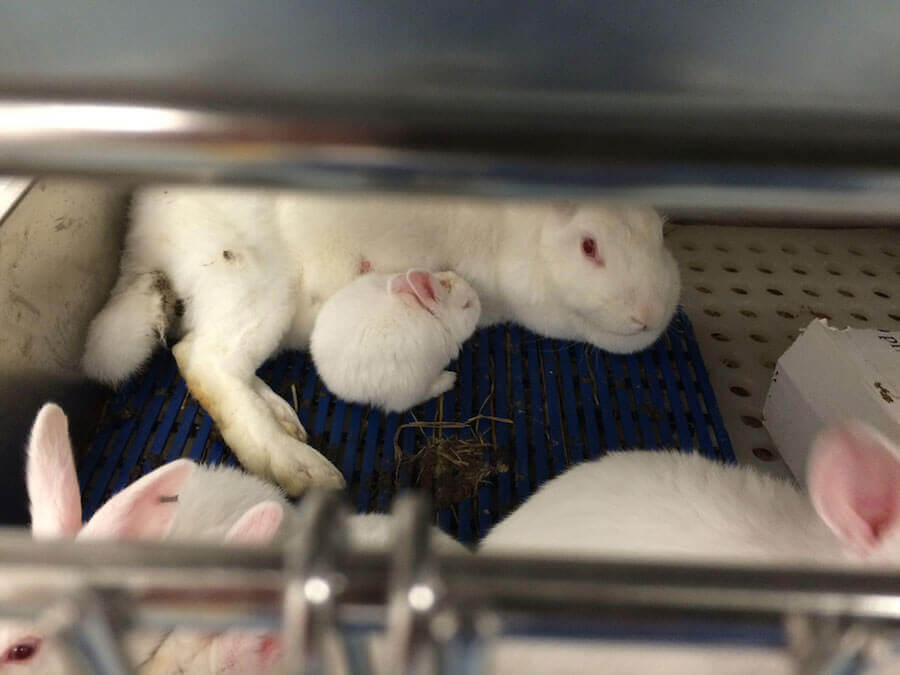
Laboratories that test on animals require victims. The following businesses supply them, breeding monkeys, dogs, cats, rabbits, ferrets, mice, rats, fish—and anyone else a lab could want. If you’ve got a white lab coat and the appetite for making an animal’s short life a misery, these companies are more than happy to satisfy that hunger. It’ll cost you, though. Blood money doesn’t get you a discount.
Covance Research Products, which was acquired by Envigo Research Models Services in 2019, was one of the world’s premier suppliers of animals for experimentation, boasting a menu of species for sale. The most recent list that PETA has obtained dates from 2014, and prices have doubtlessly increased dramatically since then:
- Monkeys
- Price varies by age, species, and country of origin
- 2-year-old long-tailed macaque (an endangered species) from Cambodia……$3,947
- Domestic rhesus from India……$8,274
- Dogs
- Purebred beagles or crossbred hounds, cost varies by age and breed
- Month-old beagle……$739
- 8- to 12-month-old beagle……$1,049
- Month-old hound……$869
- 12-month-old hound……$1,469
- Rabbits
Four varieties, prices vary, from a 5-pound New Zealand white at $89 to a confirmed pregnant Dutch-Belted at $368.74
Other companies that peddle in misery include Oak Hill Genetics, Ruby Fur Farm, and Oakwood Research Facility. Following a PETA undercover investigation into Moulton Chinchilla Ranch, that filthy facility—where approximately 1,000 chinchillas were confined to wire-floored cages in a shed reeking of ammonia—closed.
Dog breeders such as Ridglan Farms in Blue Mounds, Wisconsin; Whale Branch Animal Services Inc. in Seabrook, South Carolina; and Marshall BioResources in North Rose, New York, all breed beagles to sell to laboratories. Marshall also acquired dog- and cat-breeding facility Liberty Research in Waverly, New York. Following PETA’s undercover investigation into Envigo in Cumberland, Virginia, that hellhole was closed.
Monkey breeders and importers also abound, and they include Worldwide Primates, Envigo/Inotiv, Primate Products Inc., Charles River Laboratories, Alpha Genesis, Orient Bio, PreLabs, Mannheimer, and Barton’s West End Farms.
Pain Profiteers
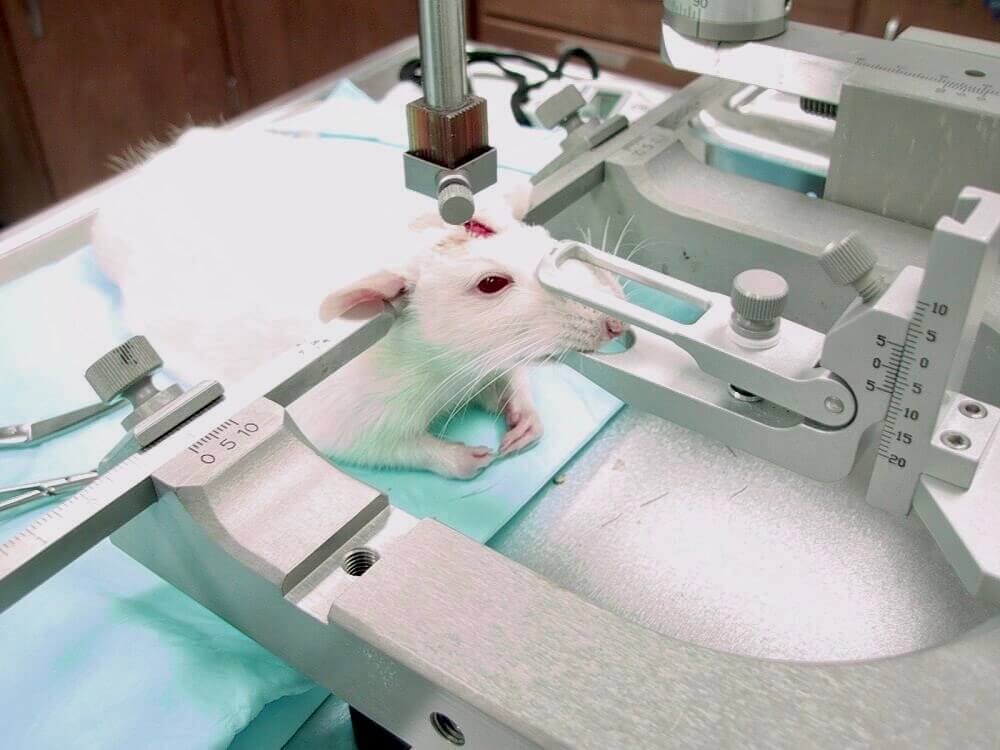
The big kahunas of animal misery, the titans of animal torment, whatever you want to call them, these are the major players in animal experimentation and those with the most to lose from scientific progress:
For-profit companies aren’t the only ones pulling in the big bucks on the backs of suffering animals.
Animal-Experimenting Universities
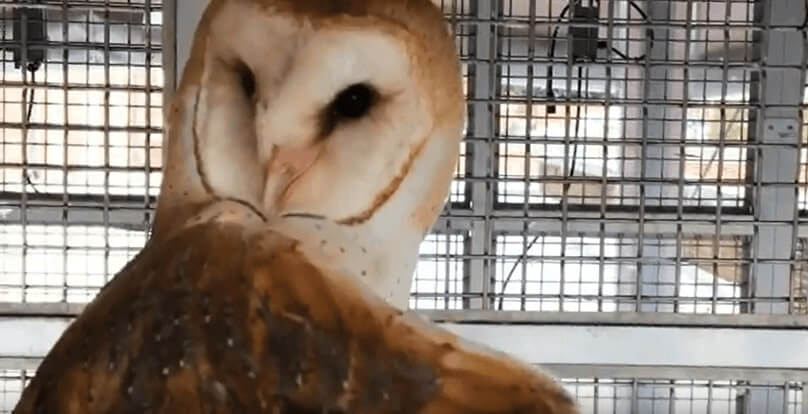
In laboratories tucked away inside universities across the country, animals are tormented and killed daily in pointless experiments bankrolled by taxpayer funding from the National Institutes of Health (NIH) and the National Science Foundation (NSF). These schools receive tens, if not hundreds of millions, of dollars every year to fund their horrific experiments. But a portion of that money also goes to the school itself, intended to offset the additional costs of running those experiments, including lighting, heat, and administrative costs, providing a financial incentive for schools to continue experimenting on animals. Here are some notorious experimenters and institutions:
- Margaret Livingstone at Harvard University has raked in $32 million in taxpayer funding from NIH since 1998 for sensory deprivation experiments on infant monkeys.
- Agnès Lacreuse at the University of Massachusetts–Amherst has received $5 million from NIH to perform invasive surgeries on fragile marmoset monkeys, ostensibly to study menopause, which they don’t even experience.
- Shreesh Mysore at Johns Hopkins University has received more than $3.7 million from NIH to cut into the skulls of barn owls, insert electrodes into their brains, and bombard them with noises and lights—pretending this will yield insights into attention-deficit disorder in humans.
- Christine Lattin at Louisiana State University was awarded a $1 million grant from the NSF to ensnare birds in mist nets, haul them back to her laboratory, deliberately inflict stress on them, and then kill them.
- Andrey Ryabinin at Oregon Health & Science University has received more than $3 million from NIH to determine whether drunk voles will “cheat” on their partners.
- The seven national primate research centers receive millions of dollars from NIH every year just for basic operating costs, and their experimenters receive millions more to torment and kill monkeys.
- Ten universities in particular are receiving tax dollars hand over fist to inflict atrocities on animals.
PETA has myriad ways for you to help animals imprisoned in university laboratories.
Government Laboratories
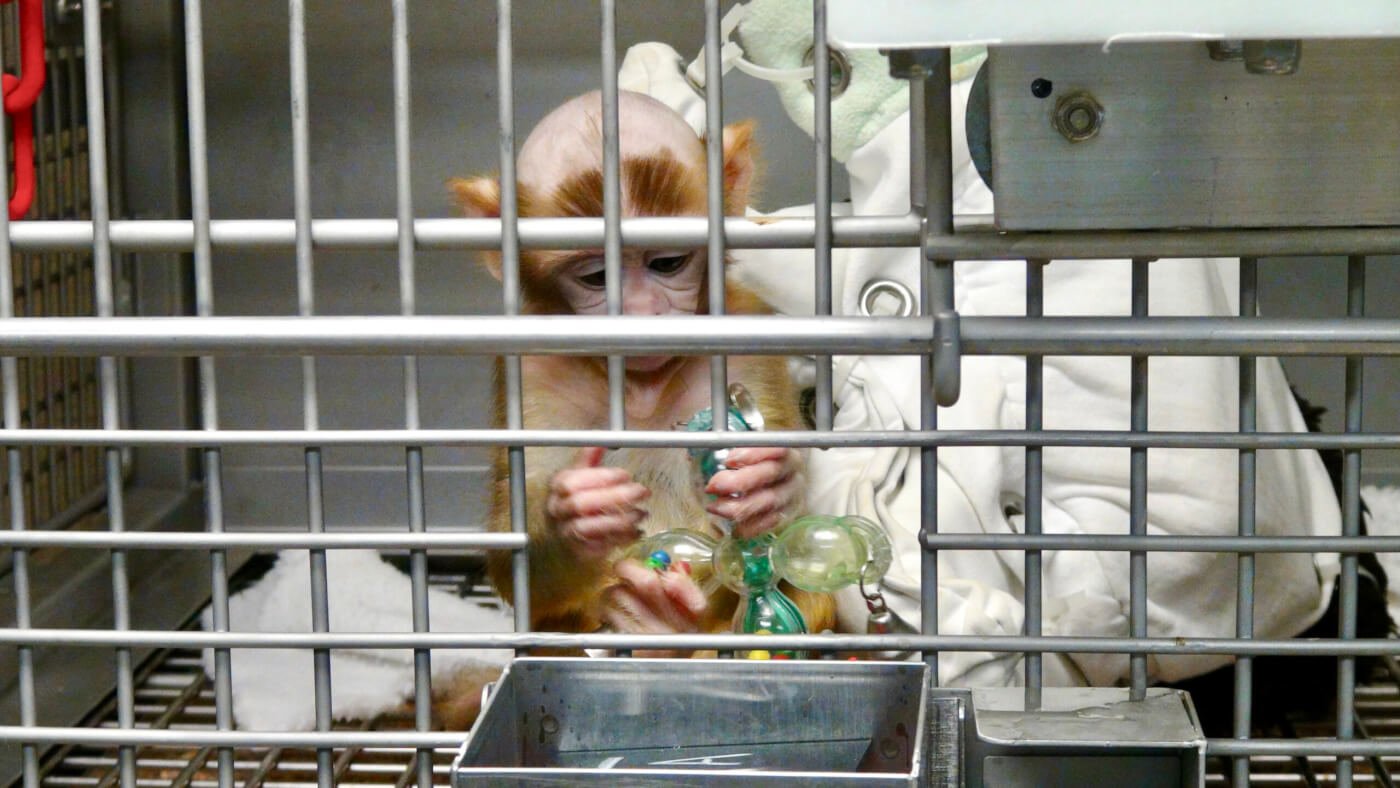
The federal government does more than just pay for others to torment animals. It’s also mired in the business itself, addicted to the same tax-money gravy train that feeds so many universities:
- NIH imprisons animals by the hundreds of thousands in its own labs.
- Elisabeth Murray, a staff experimenter at NIH, has received nearly $50 million to conduct gruesome monkey fright experiments.
- Experimenters at NIH, where mice and rats are used in cruel psychology experiments to induce or measure extreme fear, panic, despair, terror, trauma, and a sense of helplessness, also receive payouts from the public dole.
The Last Mile

Animals don’t go into laboratories willingly. Many monkeys, for instance, are abducted from their forest homes, shoved into crates, and loaded onto planes bound for the U.S. Once they arrive, they’re packed onto trucks and moved to laboratories around the country by a small number of transportation companies. Among them are JKL Secure Freight Lines, ATR Transport LLC, BioTrans, Frames Animal Transportation Service, and Direct Services Inc.
Like the laboratories they serve, these companies are notorious for failing to comply with minimum federal animal welfare laws and safety standards while raking in fistfuls of cash from lucrative contracts:
- Quebedeaux’s Transport—which owned a truck that crashed in Pennsylvania in 2022, spilling crates of monkeys across a highway, allowing three of them to escape into freezing temperatures—was shut down following a laundry list of federal complaints filed by PETA.
- JKL Secure Freight Lines has repeatedly violated federal law. The company was cited by the USDA after 336 long-tailed macaques—just off a 9,000-mile journey—were forced to sit for as long as 95 minutes in the boiling Georgia heat, confined to wooden crates on the tarmac of Hartsfield-Jackson Atlanta International Airport. It was also cited for its role in transporting 167 long-tailed macaques across the U.S. without proper veterinary examinations. After a PETA complaint in April 2022, the USDA cited it for violating this very same federal requirement 14 separate times.
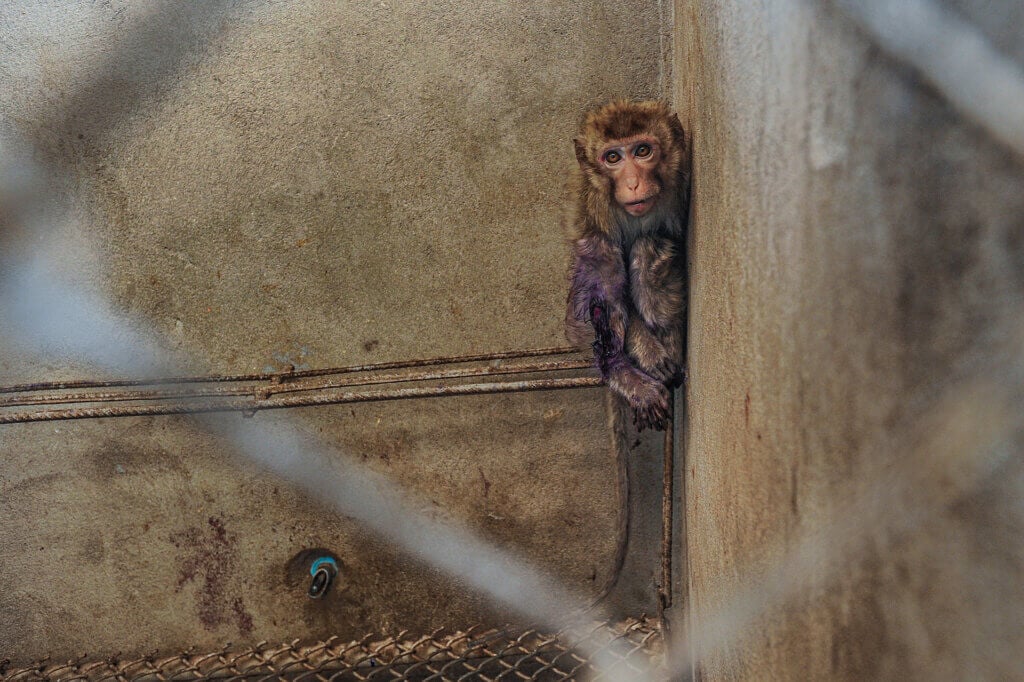 © Jo-Anne McArthur / We Animals Media
© Jo-Anne McArthur / We Animals MediaTo prevent the spread of disease, federal law requires a veterinary exam for all monkeys transported between laboratories and/or breeding facilities within 10 days of shipment. But a PETA 2022 review of federal documents showed that this law was violated at least 56 times in just over a year. At least 1,881 monkeys who had not been examined within the allotted time were trucked to and from multiple states, potentially risking another pandemic.
Support Services
Just as the lucrative business of selling shovels and other prospecting tools flourished during California’s Gold Rush, a money-hungry support industry has risen around supplying restraint devices, rodent guillotines, shock plates, and other gruesome implements that animal experimenters can’t do without.
Anti-Animal Lobbying
Every unethical industry is propped up by a phalanx of lobbyists who fill the ears of Congress with skewed information designed to ensure the uninterrupted flow of cash that bloats their wallets, compassion and progress be damned. Every move to reduce the suffering or (gasp!) improve the lives of animals in laboratories is met with white-hot hostility. Even simple attempts to ban the sale of dogs from animal shelters into the experimentation industry have been met with a full-court press by the anti-animal lobby, which deploys just as quickly to help pass laws that protect animal-abusing industries and impose penalties on animal advocates.
Animal Experiments Don’t Help Humans

More than 50 years have passed since the U.S. declared a war on cancer. But it still hasn’t been defeated. And we’re no closer to a cure for Alzheimer’s disease than we were 20 years ago. Why? Because other animals are poor stand-ins for humans, so experiments on them will always fail to produce the results we need.
Animal experimentation has failed in numerous areas of biomedical research, including the following:
- Alzheimer’s disease
- Anxiety disorders
- Attention-deficit hyperactivity disorder
- Cancer
- Depressive disorders
- Obsessive-compulsive disorder
- Post-traumatic stress disorder (PTSD)
- Schizophrenia
- Substance use disorders
PETA’s Science Advancement & Outreach division has a wealth of information about these topics and additional resources.
What You Can Do
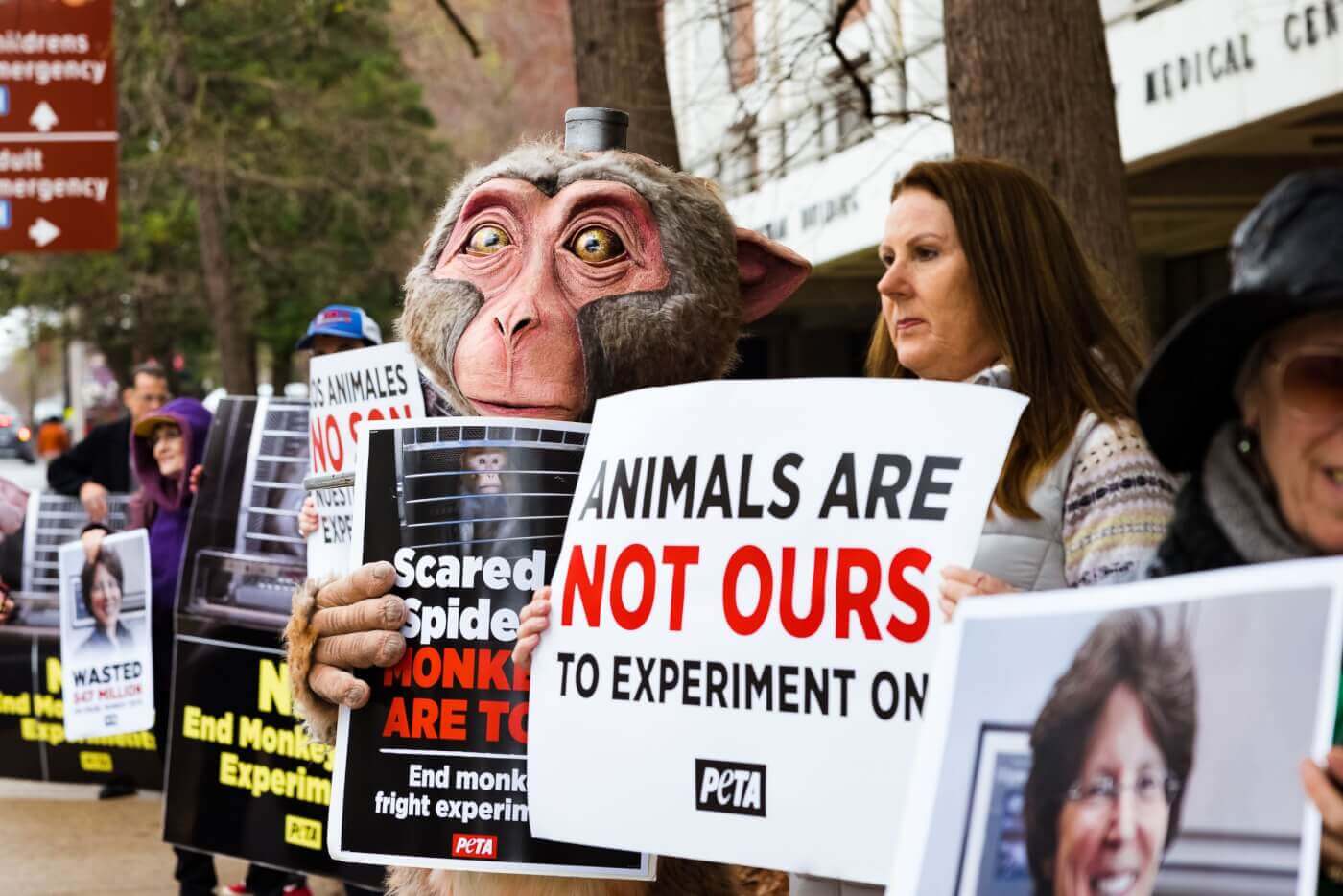
No one can impede progress forever—not even the vivisection-industrial complex, try as it might.
Everyone, take action (using the button below) for animals tormented in experiments by urging the U.S. Centers for Disease Control and Prevention to shut down the forest-to-laboratory monkey-abduction pipeline:
U.S. residents only, please also take this additional step:
Please join thousands of PETA supporters in pressing your members of Congress to support PETA scientists’ Research Modernization Deal, a workable strategy to advance science toward animal-free, human-relevant research.